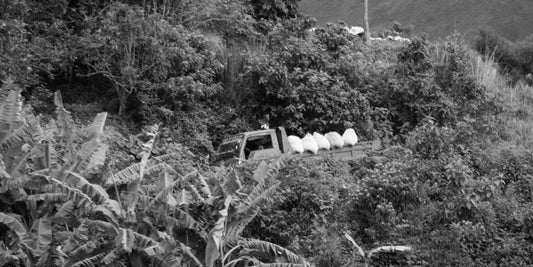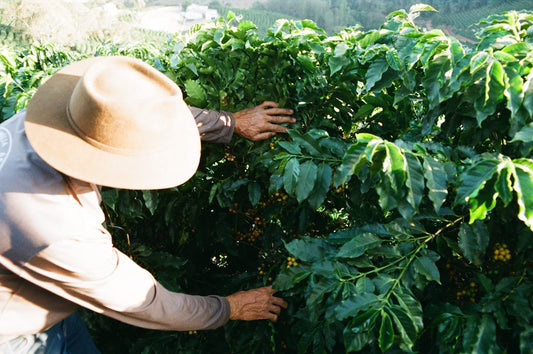
How we source our coffee from farm to slurp
Ever stared into your morning cup of coffee and wondered how it got there? I mean unless you have severe amnesia you probably recall brewing it, but what we’re talking about is how did it get all the way from a farm in, say – Brazil – to your cup. We’re going to shed some light on the supply chain of coffee and how we chose to do things at Roastworks.
The world of coffee sourcing is complicated. After all, coffee is the second most traded commodity on earth after oil, and even though we only operate in the top 4-5% of the industry (the bit that’s called speciality coffee), it’s still a minefield. For some reason the speciality coffee industry feels obligated to hide the supply chain, as if it’s a skeleton in their cupboard. We find this odd at best and troubling at worst.
At Roastworks we have always wanted to build long term relationships with ALL our suppliers and be as transparent as possible about where our coffee comes from. This includes being transparent about our supply chain.
HOW DO WE FIND COFFEES WE LOVE?
There are a whole host of coffee importers and exporters, as well as independent representatives who work for individual farms. We start by requesting samples of coffee from these companies. This is something that happens pretty frequently for us and is the norm for other roasteries too. Sometimes importers simply send us samples of coffees they think we’ll love. Once the green coffee samples arrive we sample roast them in small 50g batches on a specialist sample roasting machine, in our case – an Ikawa Pro.
Once we’ve sample roasted the beans we leave them to sit for 24 hours. We then taste them by doing what’s known as a cupping. Sounds kind of rude, but it’s usually not. Cupping is just a very rudimentary, yet consistent brewing method which makes it easy to critically evaluate the coffee. Essentially all we do is grind 12g of coffee into a little bowl and let it steep in 200ml of water for about 4 minutes. We then taste the coffee (yes, we slurp it, OK?) and decide if it’s something we’re interested in.
WHAT HAPPENS ONCE WE’VE CHOSEN A COFFEE?
After we’ve settled on a coffee that we’d like to buy we book it to be delivered to the roastery. Quite often we are selecting coffees that are already here in the UK, but sometimes we’re selecting coffees based on what’s known as a “pre-shipment” or “type” sample while the coffee is still at origin. Either way, the coffee has to be shipped from origin (on a ship, never by air freight) and lands in a commodity warehouse somewhere in the UK. We then bring it in from these warehouses into our roastery, and that’s when we pay for the coffee.
AND THEN WHAT…
Then – all we have to do is the easy bit. Roast it, bag it and send it to our customers.
OUR SOURCING VALUES
There are four core values that define how we source coffee…
- We believe in driving up the value chain of coffee. We want to be certain that a fair price has been paid for a coffee and that quality has been rewarded.
- We believe in nurturing long standing relationships with our suppliers. We want to work with producers through thick and thin. If one year their crop suffers a little because of some adverse weather conditions, we aren’t just going to jump ship and buy from someone else. We recognise that we are small, but as we grow we are becoming more meaningful to some of our suppliers.
- We want to be as honest and transparent about our supply chain as possible. We strive for better traceability and provenance in all aspects of our business and we are proud to work with the various exporters, importers and agents that may be involved. They are the cogs in the machine that make what we do possible.
- We only buy speciality grade beans that our customers will love. We tend not to get too caught up in the hype of rare, eye-wateringly expensive coffees…unless they taste absolutely out of this world, of course. For us it’s all about the taste.
DIRECT TRADE
As we mentioned before, we source a few different ways. Direct trade is a very romanticised term that has become overused in our industry. What does it actually mean? Well, in its truest form it means that a roaster sources a coffee from a farm or producer directly and then exports, ships (using a third party logistics company) and imports the coffee themselves. There can be financial benefits for the roaster by doing this but you have to move large amounts of coffee to make it viable. There definitely are some speciality coffee roasters here in the UK who do genuine direct trade. However, more often than not direct trade means something quite different.
90% of the time when a roaster describes a coffee as direct trade what they actually mean is that they have a direct relationship with the farmer or producer. They have usually been to visit the farm and they may have personally selected the coffee they are buying. However, the supply chain will be identical to ours. The only difference will be that the roaster is misleading the consumer by pretending the coffee has been traded in a more direct, and therefore ethical way. These are big accusations we’re making here, but it’s true, and we’re not happy about it.
Why does it matter? First of all, it’s misleading. That’s not cool when there’s so much focus nowadays on integrity and ethics. Secondly, it’s not always beneficial for the farmer. This is a loaded topic which we don’t have time to unpack here, but hopefully we can deep dive into later.
IMPORTERS AND EXPORTERS
Importers and exporters certainly have their place in the industry, as long as they’re all focused on achieving a higher value for the producer. Some farmers and roasters run very small businesses and often don’t have the resources required to export, ship or import coffee themselves. Working with importers and exporters may actually ensure stability for the farmer in the long run by connecting buyers with the farm year on year.
Importers and exporters are also often the organisations who are driving social change or adding value to the supply chain. For our Peru Velo De Novia we work with Caravela Coffee, whose PECA programme puts agronomists and educators on the ground to share knowledge and support producers in building sustainable businesses. And the Honduran component for The Truth comes through Volcafe, who buy directly from farmers and run their Volcafe Way programme to strengthen resilience and livelihoods.
CONCLUSION
It comes down to being transparent about your supply chain and driving value. We believe in being honest with our customers about how their coffee ends up in their cup and it’s our job to ensure the quality and value expectations are met.




